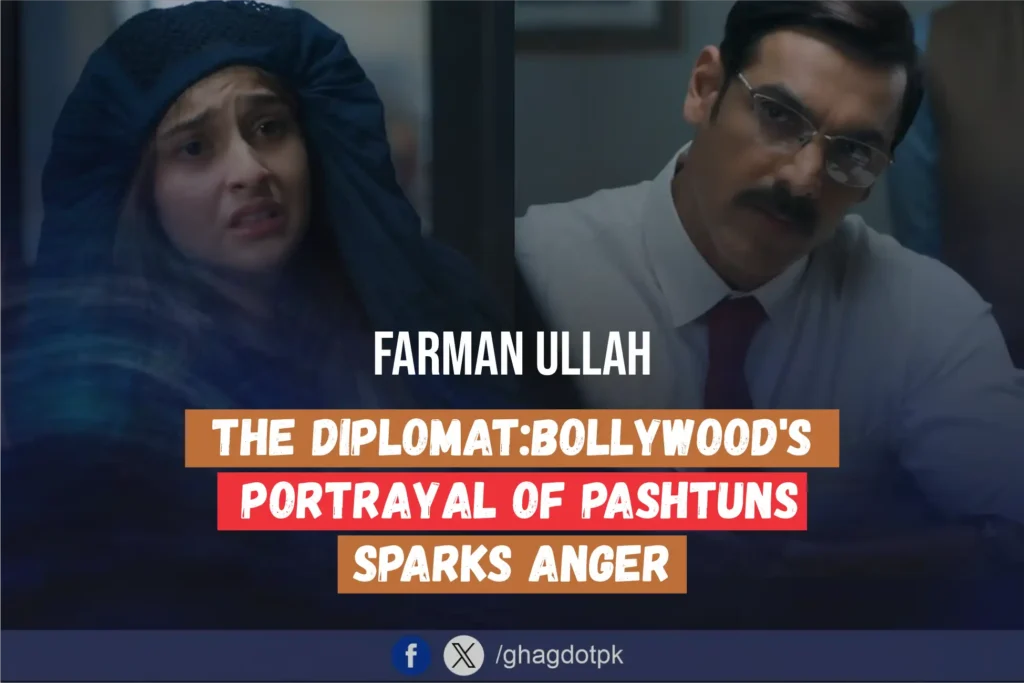By Farman Ullah
The recent release of the Indian film The Diplomat has ignited significant controversy, particularly concerning its portrayal of a female character from Buner, Khyber Pakhtunkhwa (KP). Critics argue that the film serves as a propaganda tool, casting Pashtuns and Pakistan in a negative light. The controversy has sparked discussions about Bollywood’s role in shaping regional narratives and its frequent depiction of Pakistan in an unfavorable manner.
The Film’s Narrative
The movie is centered around Uzma Ahmed, an Indian woman who, according to the film, is deceived into a marriage in Pakistan and subsequently seeks refuge at the Indian High Commission in Islamabad. The story presents her as a victim of manipulation, with characters from Pakistan—especially those from the Pashtun community—portrayed as oppressive and deceptive.
Many have perceived this depiction as a deliberate attempt to malign the Pashtun community, portraying individuals from regions like Buner as untrustworthy. Many argue that this portrayal reinforces negative stereotypes that are both misleading and harmful, as Pashtuns are widely recognized for their hospitality, bravery, and strong cultural values.
Criticism and Backlash
Several Pakistani newspapers have condemned the film’s portrayal of Pashtuns and Pakistan. Different publications have criticized The Diplomat, labeling it “a cinematic assault on the dignity of Pashtuns.” Critics argue that the film perpetuates harmful stereotypes and distorts reality to serve political narratives.
Prominent Pakistani personalities have also voiced their disapproval. Actor and activist Hamza Ali Abbasi took to social media to denounce the film, stating, “Yet another attempt by Bollywood to vilify Pakistan and its people. Such narratives only serve to deepen divides and promote misunderstanding.” His remarks reflect the frustration of many Pakistanis who believe Bollywood has a history of misrepresenting their country.
Similarly, former Federal Minister for Human Rights, Shireen Mazari, criticized the movie for “peddling falsehoods under the guise of artistic expression.” She emphasized the need for responsible storytelling in cinema, particularly in an era when films significantly influence public perceptions and international relations.
The Role of Bollywood in Shaping Perceptions
Bollywood has long been accused of using cinema as a tool to push nationalistic and anti-Pakistan narratives. Films such as Uri: The Surgical Strike, Gadar 2, and Ek Tha Tiger have been criticized for presenting one-sided perspectives that glorify India while vilifying Pakistan. The Diplomat appears to follow a similar pattern, reinforcing the perception that Bollywood frequently aligns itself with government narratives.
This trend is concerning for many cultural analysts, who argue that cinema should promote peace and understanding rather than hostility. By consistently portraying Pakistan in a negative light, Bollywood risks deepening animosities between the two nations rather than fostering dialogue and mutual respect.
Defense from the Filmmakers
Despite the criticism, the filmmakers of The Diplomat have defended their work. John Abraham, who plays the lead role, emphasized that the film does not depict all Pakistanis as villains. In an interview with India Today, he stated, “Full credit to the writer Ritesh Shah and to my director Shivam Nair, who have not painted Pakistanis as evil. They are just people, and people can be both good and bad.”
However, this defense has done little to pacify critics, who argue that the film’s overall narrative still feeds into a broader anti-Pakistan sentiment. They believe that even subtle negative portrayals contribute to reinforcing stereotypes and shaping biased perceptions among audiences.
The Broader Implications
Beyond just a film, The Diplomat raises concerns about the broader implications of politically motivated storytelling in cinema. With millions of viewers worldwide, Bollywood wields significant influence in shaping public opinion. When films repeatedly present Pakistanis as villains, these portrayals seep into mainstream discourse, affecting how audiences perceive the country and its people.
This issue is particularly sensitive in the context of India-Pakistan relations, which have been strained for decades. Films like The Diplomat risk further inflaming tensions at a time when diplomacy and dialogue should be prioritized. Many believe that cinema has the potential to build bridges rather than widen divides, and Bollywood should take that responsibility seriously.
Calls for Balanced Storytelling
Amidst the backlash, some voices from within India have also called for more balanced storytelling. Indian journalist Rana Ayyub criticized Bollywood’s increasing shift toward nationalist propaganda, stating, “Cinema should not be reduced to a propaganda machine. It should reflect truth, not serve political interests.”
Similarly, Pakistani filmmakers and artists have urged for more collaborations between the two film industries to promote narratives that highlight cultural similarities rather than differences. They argue that storytelling should celebrate shared histories and human experiences rather than fuel hostility.
The Responsibility of Filmmakers
Filmmakers hold a powerful position in shaping narratives and influencing society. While artistic freedom is important, there is an implicit duty to ensure that stories do not promote harmful stereotypes or exacerbate geopolitical tensions. The Diplomat serves as a reminder of the delicate balance between storytelling and social responsibility.
As the discourse around The Diplomat continues, it is crucial for both creators and audiences to critically engage with such content. Cinema should be used as a medium for fostering understanding, rather than reinforcing divisions. It is time for Bollywood to move beyond conflict-driven narratives and explore themes that promote peace and coexistence.
(March 26th, 2025)






